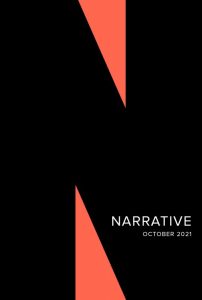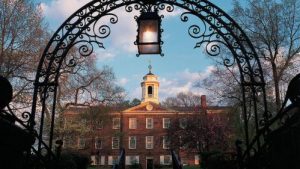Out now in Narrative 29:3: my article “Fraught Fictionality in Narratives of Future Catastrophe”, which discusses the use of fictional elements in non-literary future narratives, more specifically in The Effects of Nuclear War (1979), Storms of My Grandchildren (2009), The End of Western Civilization (2014), and The Water Will Come (2017). The article is part of my broader research project on future narratives of cities at the water in planning and fiction.

ABSTRACT:
In our future-oriented era, future visions have become increasingly important for shaping policy and public awareness. How is fictionality as a rhetorical mode used in non-literary future visions, and how are signposts of fiction instrumental—or detrimental—to conveying pathways to the future, in view of forecasted environmental devastation and radical climate change? How does the temporal mode of the scenario (which, describing the future, has as yet has no truth-value in the actual world) complicate our thinking of fictionality? This article examines fictionality in a selection of non-literary narratives of future catastrophe: The Effects of Nuclear War (1979), Storms of My Grandchildren (2009), The End of Western Civilization (2014), and The Water Will Come (2017). I develop the idea of “fraught fictionality” to denote the kind of uneasy fictionality found in future scenarios, burdened by its inclusion within a textual genre that is geared toward policy-making and anticipation.
From the conclusion:
“In our future-oriented era, policy scenarios as well as media and science reports envisioning possible futures have become increasingly important in shaping policy and public awareness. Moving from abstract to concrete, from the general to the particular, “fictional” excerpts within nonfictional texts may serve to bring the consequences of choosing a particular path home to the reader. The four texts discussed here—“Atlantis”; “Charlottesville”; “In the Year 2525”; and The Collapse of Western Civilization—combine a pragmatic framework defined by sincerity with the aim to bring across the disconcerting consequences of a possible future to the general public, by embedding local texts that contain invented stories within global texts that are emphatically nonfictional. The result is “fraught fictionality”: a profoundly contradictory mode of storytelling that brings together urgent real-world referentiality with a narrative that is conceived as intentionally invented, in view of shaping policy and public awareness.
[…]
The four “fraught fictional” texts examined here share a number of striking features. The mode of representation is largely impersonal, with a focus on third-person plural narration. Individual characters tend to be lacking, and there is a highly limited set of stock characters with foregrounded thematic functions, which sets the stage for a conspicuously narrow frame for meaningful agency (typically confined to “scientists” and a generic American president). Little to no insight is gained as to the motives, fears, or hopes of the people inhabiting future worlds, since there are no instances of “theory of mind” or references to individual thoughts, feelings, or indeed experiences. Regardless of the aim to “provide a more concrete understanding” or to “provide detail” (OTA 9), instances of qualia are rare. Also striking is the prevalence of a panoramic and distancing viewpoint. In terms of rhetorical strategies, these texts draw on a narrow field of cultural tropes from American cultural history, often with considerable ideological baggage, such as the examples of the Mayflower in “In the Year 2525” and Jeffersonian anti-urbanism in “Charlottesville.”
If the recent turn to what I here call “fraught fictionality” stems in large part from the perceived limits of storytelling tools in policy and science communication, then these conclusions, which foreground the narrow range of experiences, characters, and cultural tropes used in “fraught fictionality,” must be an urgent wake-up call for policy makers and scientists who want to turn to “fiction” for rhetorical purposes, to carefully consider the aims they want to achieve with these kinds of storytelling, and the means by which these may be reached.” (369-370)
https://muse.jhu.edu/article/809290
Thanks to everyone who commented on various versions and presentations; to colleagues at the Turku Institute for Advanced Studies and colleagues at Tampere University’s Narrare Centre and literary studies; and to the participants of Narrative 2019 in Pamplona, where I presented a paper on the same subject.




